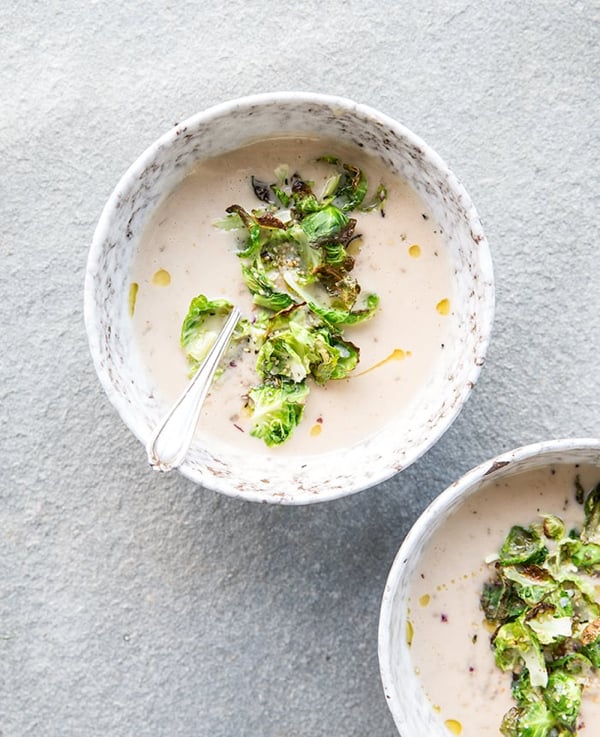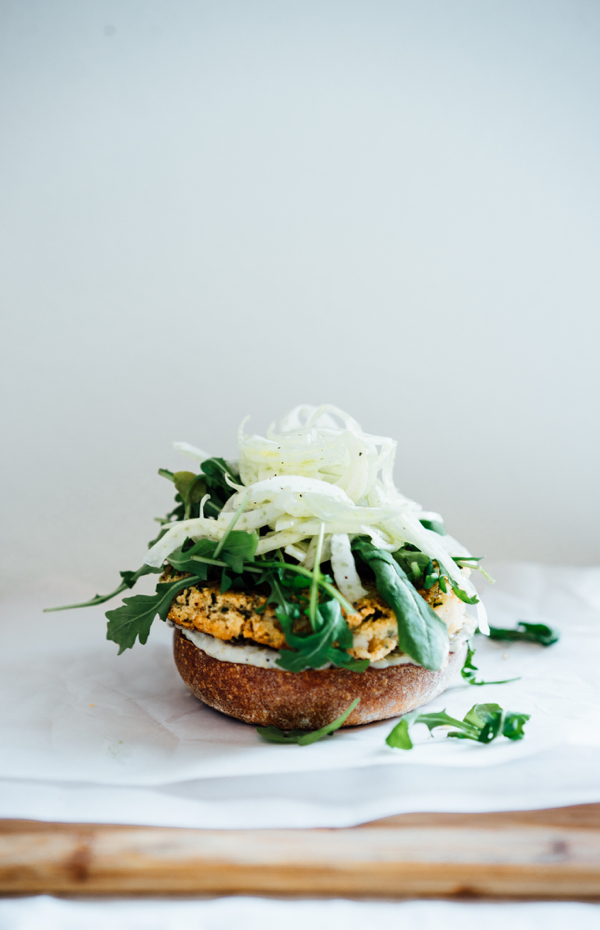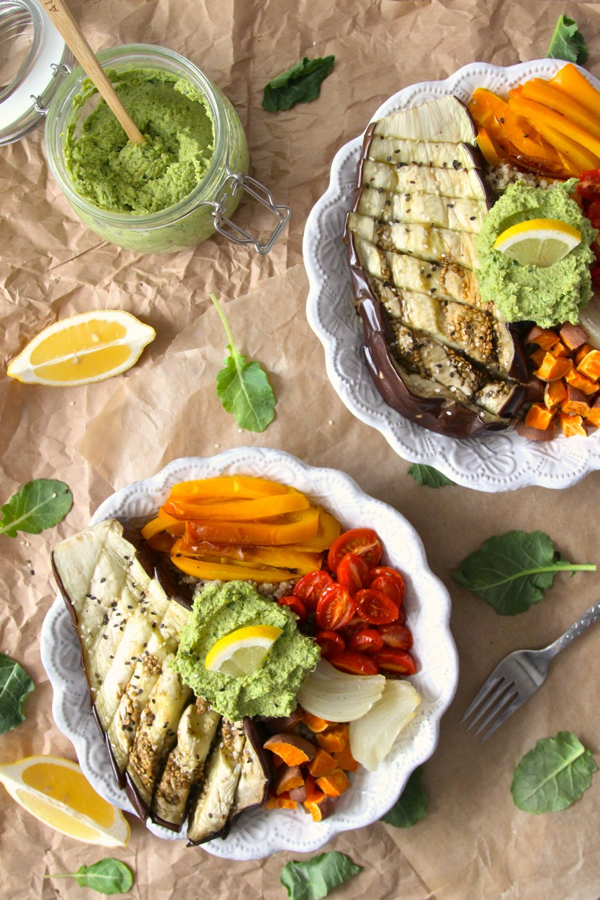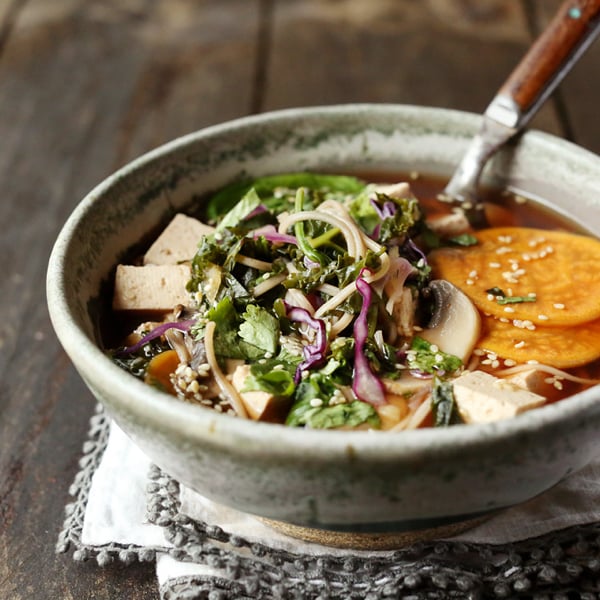Happy Sunday, everyone. I was happy to see such supportive and thoughtful responses to Alisa’s green recovery story on Friday (and I got a few green recovery submissions over email that night, which is always a big treat). Thank you for sharing your impressions, and if you haven’t read Alisa’s perspective, it’s really thought-provoking and worth exploring.
It’s the end of another busy week, and so I took some moments this morning to catch up on health and wellness news, recipes from around the web, and other reading. Here’s what caught my attention.
Recipes
First up, I just love Jodi’s beautiful white bean, fennel seed, and lemon soup with crispy brussels sprout leaves. I’m a huge fan of lemony soups, and I bet the brightness of lemon contrasts nicely with the creaminess of the beans here.
Speaking of the white bean + fennel combo, these white bean burgers with fennel slaw from Sasha of Tending the Table look so, so good. I’ve made many a bean burger, but I haven’t often used white beans as my base — time to change that. (Use Veganaise and maple syrup in place of the mayo and honey to veganize the sauce.)
My friend Margaret’s slow roasted buddha bowls with kale & sunflower seed pesto look so hearty and abundant. I love all of the variety and color here, and the dollop of pesto completes the dish!
This is my idea of perfect winter comfort food: an easy, adaptable red miso soup that’s loaded with any veggies you please.
Also some very fine comfort food: a beautiful bowl of puttanesca pasta from Nourish Atelier.
Reads
1. First up in reads, a new study that suggests that eating too few polyunsaturated fats from plant sources is actually a greater health risk than failure to reduce saturated fat in the diet. This is in the wake of the new dietary guidelines, which emphasize reduction of saturated fat overall (though they fail to give clear language about which foods should be reduced or eliminated).
I think that the study is really interesting, though I did have some questions. For example, Time‘s coverage of the study reports that it implied that “only 3.6% of global heart deaths can be attributed to eating too much saturated fat, while just over 10% of heart deaths can be traced to eating too little plant oils — a three-fold difference.” Is this true only for failure to eat plant oils, or would the same be true of nuts, seeds, avocados, olives, and other plant fats? And was it the plant oils specifically that were cardioprotective, or do people who consume more olive oil and other plant fats have other dietary habits that might explain their decreased risk?
Plenty of variables to separate, but interesting nonetheless, and certainly more proof that healthful fats have an important place in our diets.
2. When I saw the headline of this article–“Bad thoughts can’t make you sick, that’s just magical thinking“–I felt wary. I believe in psychosomatic illness, at least to the extent that I believe that stress, trauma, and anxiety can exert physiological effects on the body.
But the article wasn’t what I thought it would be, and it actually offers an important perspective for health care providers. If we overemphasize the role of psychosomatic illness, it argues, we may ultimately find ourselves attributing too many symptoms to stress or anxiety, potentially failing to spot other causes. This is certainly a real phenomenon, and it can delay the diagnosis of autoimmune diseases, chronic diseases, and other illnesses that are more mysterious and poorly understood.
The idea of psychosomatic illness is also tricky for clinicians because it can lead to the creation of “personality types” that we associate with certain symptoms, such as the classic association of a “Type A personality” with heart disease, or the unfortunate characterization of cancer patients as repressed worriers.
In the end, I think it’s important that we acknowledge the role that stress, emotion, life circumstance, and trauma can have in exacerbating or creating certain kinds of illnesses. But these factors shouldn’t be assumed or used to crowd out other lines of inquiry, and they shouldn’t be hastily attached to personality or gender.
3. An important article for women in the food industry, via Eater. It touches on the very problematic absence of paid maternity leave within the industry, and it suggests that this might be the main underlying cause of a culinary gender gap (which is often attributed to male chefs having more “aggressive” or dominant personalities).
4. I enjoyed Jeff Gordinier’s article about the tremendous energy and innovation that characterizes African-American cooking right now. As Gordinier notes, “a new generation of black chefs and cookbook authors has been reinventing, reinterpreting and reinvigorating what’s thought of as African-American food.”
I was also really happy to see Afro Vegan author Bryant Terry mentioned, as he’s a powerful food advocate.
5. Finally, I really enjoyed Michael Ruhlman’s recent article on healthwashing in The Washington Post. In spite of the provocative title, Ruhlman’s point is not to claim that kale isn’t a highly nutritious food. Rather, it’s to say that labeling foods as “healthy” or “unhealthy” in a vacuum can be highly misleading. Overall dietary patterns can either support or fail to support one’s health, but foods on their own aren’t healthy or unhealthy. They’re either nutritious or not-very-nutritious, and ultimately, the healthfulness of our diet is a complex, multifaceted phenomenon that doesn’t hinge on emphasizing one food or eliminating another.
On that note, I wish you all a happy, peaceful Sunday. I’ll be back tomorrow to share my meal plan for the week!
xo
You might also like
Happy Sunday, and thank you all so much for the great responses to Thursday’s post about “bad body days” (or “BBDs,” as a friend of mine has recently dubbed them). I’m glad that post struck a comforting chord. Here are the recipes and the reads that have caught my eye this morning. A perfectly delicious autumn appetizer: Moroccan carrot and sweet potato fries from Three Beans on a String. I love the idea of a “breakfast grain salad,” and this recipe from the…
I’ve had a chance to reflect on my internship experience in the last two weeks, and what stands out to me is how much of my own “stuff” I’ve been able to let go of, or work on. I’ve gotten better at taking care of myself. I’ve become firmer and clearer with boundaries. I’m communicating more directly. And, maybe best of all, I’ve come a long way in letting go of perfectionism. I was thinking about this a lot this week, because it…
I don’t have many photos of myself. If you were to enter my apartment, you’d find a few framed pictures of my mom and one of me at age eight or nine, all pigtails and missing front teeth, smiling directly to the camera. I love the lack of inhibition in the photo, the sweet confidence. I hang onto the image as a reminder that as a child, I was unashamed of being seen. I came into life with this quality, and it’s always there, no matter…
Whenever I write about my experience of eating disorders, I make a point of saying that the healing process isn’t linear. It’s full of odd, surprising twists and turns, realizations and moments that take one by surprise. Still, it’s natural to hope that a linear trend will emerge. After all, it’s the promise of change, of transformation, that keeps us going when the process is at its ugliest. When recovery was at its worst for me—when I was feeling the most robbed of…







Leave a Comment
Thank you for all the great reads! I’ve been chatting with a lot of women in the culinary industry about maternity leave and the impossibility of work life balance lately, and it’s definitely something restaurants need to think more about. Can’t wait to dig into all these pieces! Hope you had a lovely weekend, Gena! xo
All that comfort food looks so amazing! Especially the first two make me want to go grocery shopping right now – I’ve never cooked with fennel before but they both sound and look to die for 🙂 And thanks so much for sharing that polyunsaturated vs. saturated fat study! It’s a shame that a low fat diet got so heavily promoted over the years without anyone thinking that substituting refined carbs for the saturated fat would do more harm than good. Hopefully, that’s slowly changing and fat as a whole will no longer be demonized 🙂
That slow roasted Buddha bowl looks pretty yummy right about now!
I really enjoyed article about not labeling foods as well!